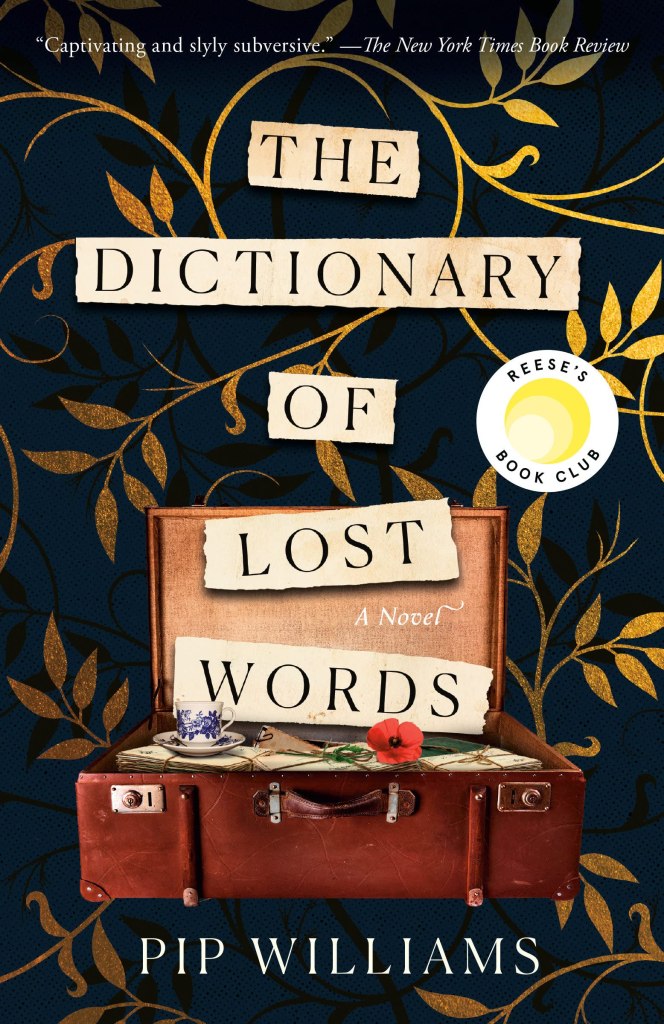
5/5 stars
Recommended if you like: historical fiction, stories that pack a punch, books set over decades, linguistics + words
This book was a surprise to me. I actually almost didn’t read it, I’d been intrigued when I first saw it and then decided it wasn’t for me, but then my mom got it for me for Christmas and I figured I’d give it a try sometime in 2023. I, obviously, loved this book. It’s so much more interesting and so much more impactful than I thought the first two times I picked it up and I’m really glad that I gave it a real chance (and I’m quite pleased that I liked it even when I was determined that I wouldn’t when I started reading).
The bulk of this book is dedicated to the Oxford English Dictionary (OED) and words and the place and people where words are given ‘worth.’ I really enjoyed the scenes in the Scriptorium and the sense of wonder and enjoyment the people working there had for the English language. As a student of linguistics, I came into the book vaguely aware of the lengthy and painstaking process that went into creating the OED, as well as some of the problems this book touches on re: whose words get valued, and I really enjoyed how much deeper this book went into the topic. I not only liked seeing the dictionary get put together, but I also liked reading the conversations Esme had with those around her about words and their worth and the worth of the people speaking (or writing) them.
This book is, obviously, about words and the OED, but beneath that it’s about power structures and intellectual ownership/credit and growing from a young girl into a woman during a rapidly changing period in time. These topics converge in Esme and Esme in turn explores them in the world around her. I quite liked her search for spoken words in her spare time and how over the course of the book she comes to understand how much the society she lives in devalues women and how much knowledge is missing because of that.
Beyond these, I also found the book to be quite impactful on the surface. I was already hooked by the words and Esme’s discoveries as she grew, but I was still surprised by how much Esme’s trials with pregnancy and WWI impacted me. I really felt for her in both of these situations and even when I knew what was coming, really desperately wanted it to be okay. I definitely had to sit in silence for a few minutes at certain parts just to process things, and I did so again when I finished the book.
Esme starts off as maybe 4 and is shown to already be in love with words. From a young age she exhibits a clear love of words and an understanding of the importance of the work going on at the Scriptorium. This natural fascination grows and she begins collecting words that fall by the wayside. I have to say, I definitely take Esme’s side in most interactions, but I am baffled as to why the one word slip, which was to be abandoned anyway, caused such a fuss even into her late adolescence and early adulthood (and don’t understand why she isn’t more upset by it…though to be fair I do think she has slight klepto tendencies when it comes to the written word). As she grows, Esme is exposed to more of the world around her and begins deciding what sort of person she’ll become. I was definitely excited when she started word collecting in more earnest and was invested in her work both with that and at the Scriptorium. From beginning to end I loved Esme, and while her circumstances shaped her, I do wish things had been easier for her.
Lizzie is a servant of the Murray household (Dr. Murray leads the Scriptorium) and is Esme’s main watcher aside from her father. Lizzie acts as a bit of a buffer against some of Esme’s impulses and is the more cautious of the two. It’s an interesting relationship because Lizzie isn’t much older than Esme herself, 8 years I think, and there’s a relationship there that’s part friendship part employer-employee, though obviously Esme isn’t Lizzie’s employer. Over time the two grow closer and true friendship becomes the main characteristic of their relationship. I think it was useful to have a character like Lizzie be so close to Esme because she provides a wildly different perspective that I think this book needs.
There are a range of other characters, from Esme’s father and the other lexicographers at the Scriptorium, to Esme’s aunt Ditte, her friend Tilda, the market woman Mabel, and compositor Gareth. Each play a different, but integral role in Esme’s life as she grows from child to adult and each has something to provide her about the world and the people around her (and of course they all can give her words).
I definitely recommend this book if you like historical fiction (and maybe even if you don’t, lol), even if you’re a bit hesitant at first. While it can be a bit academic at times, everything is explained in full and it’s really more about people who speak words than words themselves. I am a little nervous for the companion novel though since I loved this one so much.
One thought on “The Dictionary of Lost Words review”